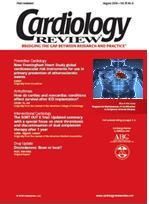Publication
Article
Cardiology Review® Online
Alcohol consumption and cardiovascular risk
Author(s):
We generally assume that having a good time must be bad for you,and no one would deny that irresponsible alcohol consumption takes a tremendous economic, social, and health-related toll on diverse populations all around the globe.
"A man hath no better thing under the sun, than to eat, and to drink, and to be merry."
— Ecclesiastes 8:15
"There can't be good living where there is not good drinking."
— Benjamin Franklin
We generally assume that having a good time must be bad for you, and no one would deny that irresponsible alcohol consumption takes a tremendous economic, social, and health-related toll on diverse populations all around the globe. But, as the venerable quotations cited above indicate, humankind has an enduring love affair with alcoholic beverages that extends far back into ancient times, when fermentation emerged as one of primitive man's earliest and most effective methods of food preservation. Indeed, many an otherwise dour spirit has been raised by recurrent reports in the medical literature to the effect that alcohol is actually beneficial  to one's health.
In the general population, epidemiologic studies have consistently demonstrated an inverse relationship between alcohol consumption and cardiovascular mortality both in men and women.1-6 This protective effect appears to be related to a reduced incidence of myocardial infarction (MI) at almost any level of alcohol intake. The relationship between alcohol and stroke is more complex. Heavy alcohol consumption increases the risk of all types of stroke, and there appears to be a linear relationship between any alcohol consumption and hemorrhagic stroke.7, 8 On the other hand, light-to-moderate alcohol consumption is associated with decreased risk of ischemic stroke.7, 8 Alcohol intake and total mortality are related by a J-shaped curve, reflecting the benefits of moderate consumption on cardiovascular mortality, and the detrimental effects of heavy consumption on longevity due to causes such as liver disease, various types of cancers, and accidental death.9
Understanding the relationship between alcohol intake and cardiovascular risk is complicated by the independent association between alcohol and blood pressure. Heavy alcohol consumption is correlated with elevated blood pressure in observational studies.10-12 Blood pressure elevation begins with consumption of ~3 drinks per day for all racial groups and both sexes. This positive relationship between alcohol intake and blood pressure has led to concerns that alcohol consumption may result in higher mortality and more adverse cardiovascular outcomes in hypertensive patients. The important relationship between alcohol and cardiovascular mortality among hypertensive individuals has been explored in very few studies and, to our knowledge, none has specifically evaluated the correlation between alcohol intake and nonfatal MI.
The study by Beulens et al13 addresses this important question. The authors report a prospective follow up of 11,711 hypertensive male health care professionals aged 40-75 years who entered the study without any baseline history of cardiovascular disease, stroke, or cancer. Using a food-frequency questionnaire, alcohol consumption was assessed by assuming that an average glass of wine, bottle of beer, or shot of liquor contains between 11 and 14 g of pure ethanol. Compared to abstainers, the risk of an MI over a 16-year period demonstrated a protective effect beginning at an average daily alcohol consumption of > 5 g/day. The risk reduction for MI appeared to be dose-dependent with a 19% decrease in the group consuming 5-9.9 g/day and 59% reduction in those men with the highest level of alcohol intake, greater than 50 g/day. Overall mortality and total cardiovascular disease mortality were not statistically different, although favorable trends were noted.
Before we head for the nearest tavern in pursuit of cardiovascular protection, a few caveats are needed. Firstly, in this study, alcohol consumption and hypertension were self-reported and such data are prone to significant error. Secondly, because of the low incidence of stroke in this relatively young hypertensive population, the critical relationship between alcohol intake and stroke is incompletely addressed. Further studies in older individuals will be required to clarify this relationship as stroke incidence rises dramatically with age and becomes the predominant cardiovascular endpoint in elderly hypertensive patients.
In our opinion, the biggest limitation relates to the fact that the study population consisted only of men. There are inherent differences of alcohol metabolism and its effects between men and women. In comparison to men, women have lower stomach alcohol dehydrogenase activity, leading to higher blood alcohol levels after comparable alcohol consumption.14 This increases the risk of liver disease and various forms of cancer and hence total mortality in women at lower levels of alcohol consumption.15 Clearly, more information is needed regarding risks of MI and stroke in hypertensive women who consume alcohol before definitive recommendations can be made.
Nevertheless, when all is said and done, the news is good, and the results of this study add to the wealth of evidence accumulating in favor of the cardioprotective effects of moderate alcohol consumption. As Plato put it: "He was a wise man who invented beer."






